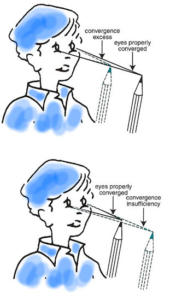BOOK ONLINE NOW
The field of paediatric optometry is quite fascinating and has been an area of special interest to Aphrodite Livanes for over 30 years.
Children’s vision problems can have a negative impact on a child’s physical, social and educational development. With 1 in 4 children* suffering from undetected vision problems, it is important to bring your child in for a regular eye checkup.
Some of the most common eye conditions in children include:
We can provide eye exams for children as young as 6 months of age, so that any vision problems are addressed as early as possible. While testing for colour blindness can be done from age 10 onwards, we may be able to detect colour blindness issues even earlier.
Sometimes a child can fail to develop focusing stamina during their early years, but in the vast majority of cases focusing problems arise from fatigue as a result of sustained near visual tasks such as reading, writing, computer, iPad, phones etc. Activities requiring prolonged close-up vision can be fatiguing for some children. The effort required can sometimes cause a breakdown in the visual system, leading to focusing and convergence problems. This can even happen in the adult eye, especially if we are tired, or have started doing a lot of close-up work.
When children having difficulties focusing, particularly with items that are near, it is not so much an eyesight (or clarity) difficulty, as a problem in maintaining accurate, comfortable focus.
One of the most common eye conditions in children, focusing problems usually occur during or soon after the task in question. The symptoms may include, but are not limited to the following:
Prescribing of spectacles for close work may be all that is required. However, for some focusing problems, a behavioural optometrist can prescribe visual therapy activities for your child to practise at home. Treatment duration will depend on the particular patient’s condition.
Visual hygiene must also be considered. Regular breaks from near tasks as well as a good working distance (generally elbow-to-fist) from reading or writing material is important, and good lighting is essential at night.
A child with a convergence problem is unable to turn both eyes inwards together, and struggles with maintaining this posture. Most times it is a fatigue problem caused by close work in susceptible individuals. The child may never have refined this ability, but it is only with the commencement of school work and learning to read, that this problem becomes more apparent. Another reason may be that the visual system may be fatiguing and allowing one eye to drift out.
Convergence insufficiency is a condition in which the individual has difficulty keeping both eyes turned in to point in the same position when they are doing close work (eg reading, writing, and computer work).
 Children with poor convergence will sometimes have poor eye-hand coordination and fine motor skills, and will tend to avoid close-up tasks that require these.
Children with poor convergence will sometimes have poor eye-hand coordination and fine motor skills, and will tend to avoid close-up tasks that require these.
Paediatric optometry treatment will sometimes require the prescription of spectacles. In some cases, because these lenses reduce the demands on the visual system, this is all that is needed to be done. In other cases however, vision therapy (to be followed at home) will be needed to rebuild and develop the visual stamina and convergence skills.
Tracking is the ability to control the eye movements accurately to keep the eyes on the target, whether the object is moving or stationary. It is a skill that is required to follow a ball in flight, or a line of print on the page or screen – so it is especially important in reading.
A child may not tell you that he or she has tracking problems because they may think the way they see, is the way everyone sees.
Signs that may indicate a child has a tracking problem include:
Most times, your child will be required to wear spectacles for at least 12 to 36 months. Most children outgrow the need for their glasses, however some never improve sufficiently to stop wearing their spectacles for reading completely.
Children who have reading spectacles, do not become dependent on them and do not worsen through the usage of spectacles. Children should have regular yearly reviews throughout their schooling life as the demands of the classroom change with different school year levels.
* ACBO – Vision Screening Outcomes of Grade 3 Children in Australia (PDF)
Should you have any concerns about your child’s vision and eye health, make an appointment with an optometrist with over 30 year’s experience in paediatric optometry – Aphrodite Livanes on (07) 3824 1878.
© 2026 Aphrodite Livanes Optometrists Alexandra Hills Brisbane. All rights reserved.